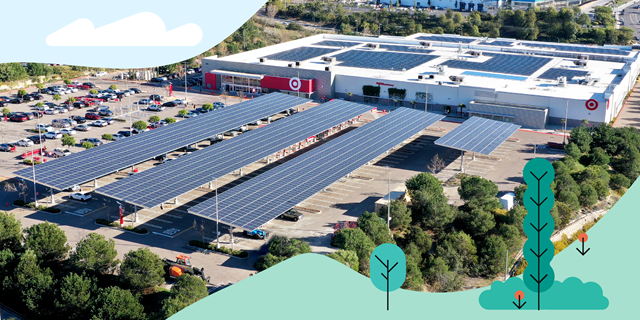Target, Amazon Reveal Sustainable Store Models
Target and Amazon both revealed environmentally friendly store models this week and announced they are seeking certifications from the International Living Future Institute (ILFI).
The newest Amazon Fresh store (which brings the total to 26) is located in the greater Seattle area and is seeking the Institute’s net zero carbon certification. Target’s retrofit Vista, CA, store has applied for ILFI’s net zero energy certification.
Target said it will test multiple innovations to reduce the building’s emissions and the store will inform Target’s investments in new stores and remodel programs that help guide the retailer’s efforts to achieve its sustainability goals.
Amazon will be able to measure the real-time impact of its store’s upgrades via a system built by Amazon Web Services’ Professional Services Sustainability Practice, the retailer said. It will look to apply what it learns to future Amazon stores and buildings, helping accelerate its path to net-zero carbon by 2040 as part of The Climate Pledge.
“We know many customers are prioritizing sustainability in what products they buy and where they choose to shop,” said Stephenie Landry, vice president of Amazon Grocery. “With our newest Amazon Fresh store, we are taking the next step on our path to becoming a net-zero carbon business by 2040, and we welcome customers to experience this firsthand while shopping with us in this store.”
“We’ve been working for years at Target to shift toward sourcing more renewable energy and further reducing our carbon footprint, and our Vista store’s retrofit is the next step in our sustainability journey and a glimpse of the future we’re working toward,” said John Conlin, senior vice president of properties, Target. “Our new stores and remodel programs are designed to help achieve our sustainability goals as we test, learn and scale our innovations over time across our operations.
- Target’s Vista, CA, Store
The store will generate renewable energy through 3,420 solar panels across its roof and newly installed carport canopies. The site is expected to produce up to a 10% energy surplus each year that it can transmit back to the local power grid.
The building also features elements to further reduce emissions, such as powering its HVAC heating through rooftop solar panels, instead of natural gas.
The store switched to carbon dioxide refrigeration, a natural refrigerant, that Target will scale chain-wide by 2040 to reduce its direct operations’ emissions by 20%.
- Amazon Fresh, Seattle, WA
More than a dozen upgrades and features have been incorporated throughout the design and development of the 35,000-square-foot Seattle space. As a result, Amazon expects the store will save nearly 185 tons of CO2e each year, equivalent to driving around the Earth 18 times in a standard passenger vehicle (Calculation based on CO2e saved, using the EPA carbon calculator).
Updates to this store include transitioning to a CO2-based refrigeration system, which reduces greenhouse gas emissions by 38 metric tons per year compared to a conventional system.
The store also uses steel byproducts in the concrete floor to reduce the embodied carbon—the carbon associated with the manufacturing and installation of the flooring—by nearly 40% compared to a standard concrete floor. Some upgrades will be used at all Amazon Fresh grocery stores moving forward, such as the lower-carbon concrete flooring.
The store features a fully electric kitchen space, where teams prepare fresh food, that reduces the need for fossil fuel combustion in the store.
Amazon is also electrifying the store using 100% renewable electricity sourced from Amazon’s renewable energy projects.
Customers shopping in-store will be able to choose from a variety of Climate Pledge Friendly products, ranging from grocery items to household cleaning and beauty products.
Excess food items will be donated to local food banks.
This Amazon Fresh location is seeking Zero Carbon certification from the ILFI, a leading nonprofit dedicated to advancing sustainable building practices. ILFI-certified buildings must be energy efficient, have all electricity provided by renewable energy, demonstrate a reduction in the embodied carbon of building materials, and prove that all carbon emissions associated with the manufacturing and construction process have been neutralized. To receive certification, ILFI will review 12 consecutive months of performance data to ensure the new store meets this standard.
“In order to deliver on our commitments to The Climate Pledge, we must work together across all areas of our business to develop solutions to decarbonize,” said Kara Hurst, vice president of Worldwide Sustainability at Amazon. “It’s meaningful progress to open our latest Amazon Fresh Store seeking net-zero carbon certification, and I’m proud of the innovation and technology that the store offers to customers and employees, and for the environment.”



